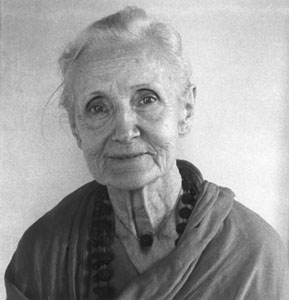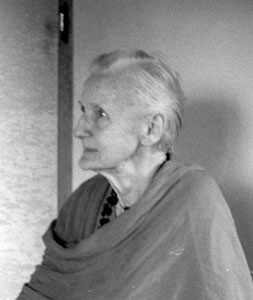32
Lucy Cornelssen
Ramanasramam
Tiruvannamalai
29th January 1981

Mr. N. is now leading me to the first official selection — he knows about last night’s Interview with the Greenblatts; he wants to know what I said, what they said, what I thought, what they thought…
Arunachala is smiling down on us, its top partly veiled in white mist, the only mystery in a brilliant sky. This is a morning phenomenon peculiar to the Hill; the veil lifts by late morning.
We are approaching another compound much like the one where I am staying. The Ashram properties have spread in all directions. In a small one-room apartment typical of most of the buildings, lives a much respected elderly German woman. She is talking to two members of the Ashram office. She makes room for me to sit at the edge of her sofa-bed. She wears deep orange robes. Her hair is white and so is her complexion. She is explaining with much seriousness the papers she hands over to the men, they do namaste and leave.
Mr. N. then draws up one of the empty chairs and presides over the Interview.
Interview 32
I’m a professional writer, always have been. I lived in Berlin much but was born in the country. I was interested from the beginning in Eastern wisdom. About thirty years ago someone brought me the only book available in Germany on Ramana Maharshi; it was by Professor Zimmer, the famous Indologist. The title was: The Way to the Self. I was well impressed, but it was the traditional Upanishadic and Vedic thought so I wasn’t as enthusiastic as one innocent of those things. A year later someone else brought me the same book. This happened the next year too. But I kept thinking: This is not professionally interesting to me.
The interest now in Germany is a new wave, but even in those early days I knew there was a task for me, but where to find it? Then something very funny happened. My brother wrote — I had been living in a forest for eleven years: he wanted me to take care of his dogs while he went away. I thought he had gone mad to ask such a thing. But I went because I knew I would be able to study rare books at Bonn University Library.
I wanted to read Ramana’s works in the original, so I asked for a Tamil grammar in German. I started learning Tamil and in the course of time ordered all his books from the Ashram and translated them into German.
How long ago was all
that?
About thirty years ago — Yes — I’m now 80, I was 50 then.
When I finished the first book in 1956 I came to India to verify if my work
was correct. It was called: The Life and Works of Ramana Maharshi.
Does that mean you have
been living here for twenty-five years?
Yes — with short breaks in Germany when I was ill. Here I feel well because
I like the simple life, although I also lived like that in Europe.
What were the other books
you translated?
I have translated practically all Bhagavan’s books into German, and
I have written a biography because those reading the teachings want to know
the teacher. I have even written some English books on the same subject. But
what is it?… I consider myself as a secretary to Ramana Maharshi, nothing
more.
How do you spend your
day at the moment?
There’s no program… I’m not sure of my health these days.
If I am all right I go to the Ashram — you know they don’t allow
women to stay in the Ashram. I go to sit by the samadhi
and take books from the library. The food is sent to me, so I have no household
work. The Ashram built this one-room cottage for me. I do a little correspondence
in German and French for the office. If there are questions too elaborate for
them, I am to deal with them. There is no set program, thanks God!
Are you preparing any
other books for the press?
I am working on a book about my life in India, but at my age I can’t count
that I will finish it. It’s about Ashram life.
Someone I met recently
described Ashram life as hell.
Oh, it’s not so bad — at least not here. Nothing’s prescribed.
People come with their own practice and continue it. Those used to the comforts
of life will need time to adapt. Here there’s no differentiation of religion
or background; everyone goes his own way. Those in need of advice can ask the
older Ashramites — they are always willing to help. There are no difficulties
here, in my opinion.
Can you give the essence
of Bhagavan’s message?
Yes, it’s simple. It’s the quest for the “I” which is
the practice leading to the Great Self common to all.
Do you consider this
path suitable for everyone these days?
Of course everyone’s problems are individual. Most people searching are
sincere in seeing they have lost something, they haven’t found the purpose
of life. Some search for occult power, yogic power. They don’t find that
on this path as Ramana never encouraged these things. One can give advice but
not everyone can take it.
Do you think Bhagavan’s teachings can help those
caught up in the confusion of the world?
All confusion is due to the wrong attitude towards our Self. That causes all
the world’s difficulties. We have to learn to know the Self before we
can live harmoniously in a better state. And this is not a social problem; we
cannot change circumstances… we can only change ourselves and our attitude
to things. Once we renounce desires and fears, everything is all right. We can
then accept whatever comes, let go of what has to go. And that is the basic
teaching of Bhagavan Ramana Maharshi.
How does this affect
those with families, with careers, with obligations?
Bhagavan was often asked: Should I become
a sannyasi
and leave the world? He always replied: If you should, you would not ask. This
means that total sannyas,
total renunciation is a command from the Higher Power, not according to the
will of an individual. We are all put by that Higher Power in a certain position
which is best suited for us to train for the spiritual life, for spiritual progress.
The difficulties of the world are as school material, and by facing them and
overcoming them we learn, we develop.
In Bhagavan’s case there was no need
for any training.
Well — the astonishing thing about his enlightenment is that it happened
when he was more interested in football — he was 16 — and bored
by English grammar and school. Without him doing anything, one day he was overcome
in his uncle’s house by what he recognized as the threat of immediate
death. He was not shocked and didn’t call for help but stretched himself
out wanting to know what is dying. He then perceived the dying was only by the
body and that there’s an inner identity which had nothing whatsoever to
do with this event. It was then he discovered this is the real “I”
of a human being which has to be found as the center — the part that never
dies, the part that is eternal. The effect of this experience stayed with him
— it never left — so he knew it was the Truth. This experience was
never coloured by personal meanings and opinions. All great mystics have experienced
the same thing, but they immediately translate it into the religious ideas they
follow. Ramana didn’t know anything so he couldn’t colour it. In
his case we have the pure experience of the Self and nowhere else.
How did that experience
change Ramana’s life?
The change was immediate. Everyone round him was shocked. He wasn’t interested
in anything — he was an intelligent boy but wouldn’t do his school
work. His brother said: What’s the use of someone like you going to school?
Ramana knew he was right; he left his home for the holy Arunachala where gradually
this Ashram was built.
Did he ever travel to
teach?
Never. He never went out nor tried to attract followers. He didn’t take
part in the freedom movement nor anything political. When he was invited to
speak outside, he replied: I am here — whoever wants to meet me can come
here. He never left the Hill for fifty-four years.
Can you describe Bhagavan’s last years?
Yes, I can. He had cancer of the throat, so for the last two years suffered
horribly but never showed signs of impatience. He was always available to visitors
up to his last hour because he would explain: They have come to see me and believe
it is enough to be in the presence of a sage. He was unable to talk and died
in the presence of about fifteen hundred people who were weeping silently. At
the moment of his passing there came from the East a great meteor in the sky
which slowly vanished behind the holy Hill. This was nature’s signal,
salutation to the sage as he left the body.
I see the Ashram is full
of many young people who can hardly have been born when Bhagavan left.
The secret of this Ashram is that before he passed, as his devotees were complaining:
What should we do when you leave us? — he was telling them: “You
put too much importance to this body — where shall I go?… I shall
stay here.” So that’s why those coming here feel the living Presence,
the importance, the help and guidance of Ramana Maharshi. Yes — that’s
the secret of this place.
|
